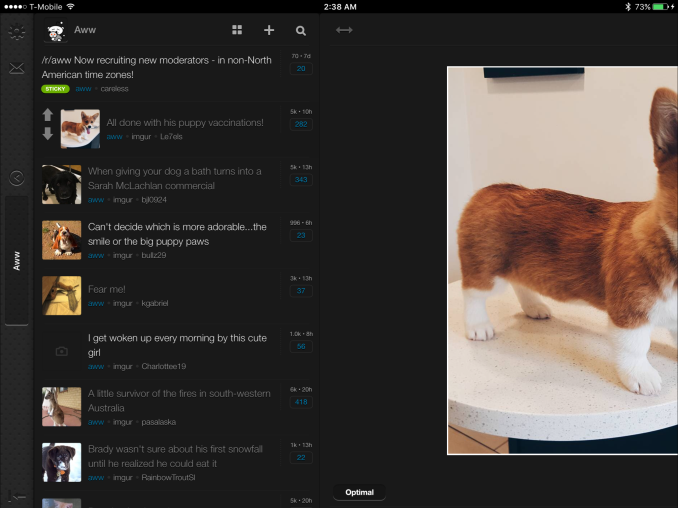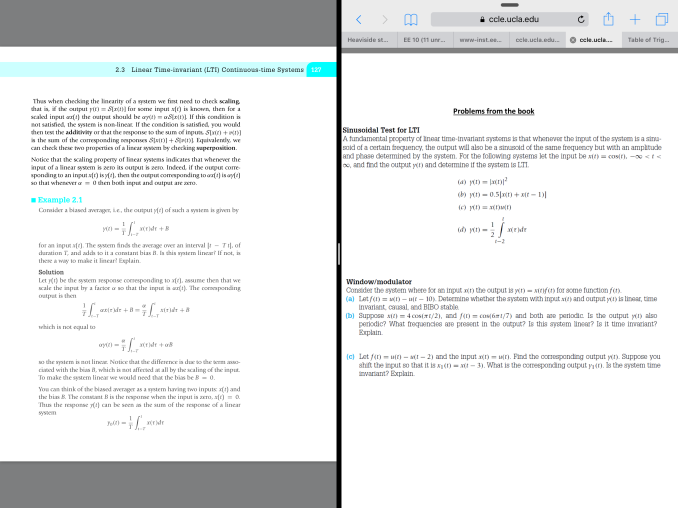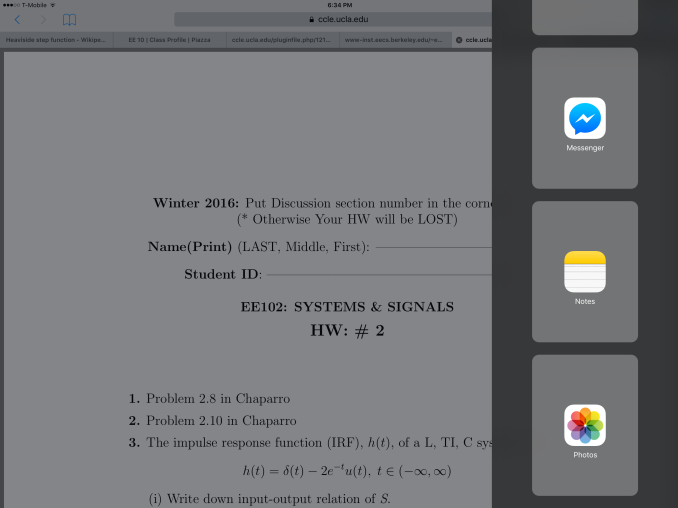The Apple iPad Pro Review
by Ryan Smith, Joshua Ho & Brandon Chester on January 22, 2016 8:10 AM ESTSoftware UX
For those that are unfamiliar with our other articles, we reviewed iOS 9 at its release back in September. If you aren’t familiar with what has changed in the move from iOS 8 to iOS 9 I highly recommend reading it as for the most part I have nothing new to say in the context of what was covered in that review. Instead of treading old ground, it’s worth discussing the specific aspects of the user experience that are unique to the iPad Pro.
The first, and perhaps most obvious change is the display size and resolution. While the aspect ratio is the same as the iPad Air, the significantly increased display size and resolution also affects applications. For the most part I haven’t noticed any issues here. However, in some cases there are still applications that haven’t been properly redesigned for the larger display, so they end up simply being purely upscaled versions of applications designed to fit 7.9 and 9.7 inch displays. This tends to look fairly ugly in my opinion but it does work without issue when dealing with backwards compatibility.
In cases where applications are updated to fit the iPad Pro, designs are generally well-executed and take advantage of the additional screen real estate. It’s probably not a surprise to know that most applications fall under this category, but it’s worth mentioning at any rate.
The larger display size also greatly enhances the utility of split-screen multitasking on the iPad Pro, as it’s generally quite useful to be able to run two almost iPad Air-sized apps simultaneously on the iPad Pro. As discussed in the Apple Pencil section of this review, being able to read a PDF and take notes/do problem sets based upon a document opened in Safari is incredibly useful and helps with productivity. There are other applications here to be sure, but I think an education setting was where I found the most value. However, it's worth mentioning that the multitasking UI feels like it isn't really designed for a future where hundreds of applications will occupy the slide-out multitasking menu.
For the most part, iOS is smooth and performant on the iPad Pro. However, there are a few notable cases where I did notice frame drops. For whatever reason, this seems to be basically limited to the Notes application. It seems that as time has gone on it has become increasingly difficult for anyone shipping a mobile OS to make everything smooth all the time, likely a product of their increasing complexity and larger code base.
Overall, I don't have as much to say here. When the only two competing tablet operating systems worth discussing in comparison to iOS are either neglected (Android) or heavily reliant upon legacy applications that really need a mouse and keyboard to be used properly (Windows), iOS stands alone as basically the only touchscreen OS worth using. I don't think the solution to the problem of the keyboard with the iPad Pro means that it needs a touchpad, nor should using both keyboard and touch simultaneously in the deployed mode be the dominant method of interaction. Trying to do the former is basically just emulating a really terrible laptop, while the latter makes for poor ergonomics almost universally.
While it may be appealing to make a tablet that is also a laptop due to the nature of legacy Windows applications, trying to make such a convergence device is a great way to make either a compromised laptop or a compromised tablet. The other half of the functionality is almost never going to be used in practice if my experiences with Surface Pro are anything to go by. Android showed arguably even more promise than iOS as a tablet OS due to its more traditional computer than appliance OS structure, for whatever reason the promise that came with the structure of Android didn't pan out in execution.
As a result, the iPad line stands alone in software, for better or for worse.













408 Comments
View All Comments
ddriver - Friday, January 22, 2016 - link
Should have named in iPad XL or something, this device will barely suit the need of any professional. Performance is good, but without supporting professional software, the hardware is useless.Coztomba - Friday, January 22, 2016 - link
And why would anyone bother to make professional software if the hardware wasn't capable? They needed a starting off point to say "Hey we can produce the hardware to run pro apps on a iPad. It's only going to get better. Start developing!"ddriver - Friday, January 22, 2016 - link
If anyone could stimulate software companies to do that, I guess that would be apple with its mountains of money and strong sales. They do have enough resources to do the software themselves.Mobile device hardware has been capable of professional workloads for at least 2-3 years. Nobody bothered to do it. Big software companies did not port their applications to ARM, instead they made cheap, crippled lesser versions. This is IMO a stupid move, they probably did this to promote their professional software to common folk, but it would have been more lucrative to bring professional software to mobile platforms.
There are 2 main issues with mobile platforms - memory and CPU performance. Modern software is very bloated memory consumption wise, especially software relying on managed languages, the latter are also significantly slower in terms of performance than languages like C or C++.
There is one big issue with legacy professional software - it originates back from the days developers were locked in platform specific application development APIs, so it represents a significant effort to port them to mobile platforms - essentially, most of the stuff needs to be rewritten.
But a rewrite in faster and more efficient language, taking advantage of contemporary technology such as OpenCL can easily bring professional software to mobile platforms at an experience as good as that of desktop workstations. Naturally, more efficiently written software will also run that much better on powerful desktop machines as well.
mr_tawan - Friday, January 22, 2016 - link
Not all pro are in the multimedia industry, you know :-).For most office workers, for instance, the only things they might need are notetaking (onenote), email (outlook), wordprocessor (word), and calendar (onenote). Most all tablet are capable to all of that, but it is a bit awkard to work with (due to the missing stylus, and not-so-comfy keyboard).
With iPad Pro which, well, address this issue in the same way as the Surface Pro by adding keyboard and stylus to the tablet. It's much easier to use the table extensively (rather than just browsing web and watching video, which is hardly described as a profession job). So I personally think that adding these two options could takes the iPad into the 'professional' realm.
I think that Apple would love to have iPad to complement MacBook (and Mac Pro), rather than to compete. If you need more power than just by Mac Pro :-).
ddriver - Friday, January 22, 2016 - link
Yeah, why use one device when you can buy and lug around two devices instead.melgross - Friday, January 22, 2016 - link
There's actually quite a lot of professional software available on iOS, and has been for some time. I suppose if you do t use iOS, and so do t know what's a bailable, you can say that little is available, but it's simply not true. Microsoft itself had about two dozen professional apps on iOS. You really need to look through the App Store.ddriver - Friday, January 22, 2016 - link
What would those 24 ("two dozen") professional microsoft apps be?Dave Bothell - Saturday, January 23, 2016 - link
Word, Excel, PowerPoint, Outlook, OWA for iPad, Sunrise Calendar, OneDrive, OneDrive for Business, OneNote, SmartGlass, Skype, Bing for iPad, Remote Desktop, Lync, Office 365 Admin, Intune, Azure Authenticator, Sway, SharePoint Newsfeed, Dynamics CRM, Dynamics Business Analyzer, Dynamics Time Management, PowerApps, Global Startup Directory. There's more, but you asked for 24.xerandin - Saturday, January 23, 2016 - link
Smartglass isn't a professional app--it controls Xbox 360s or Xbox Ones, depending on which version of the app you install.dsraa - Sunday, January 24, 2016 - link
you forgot bing.....bing isnt a professional app either.